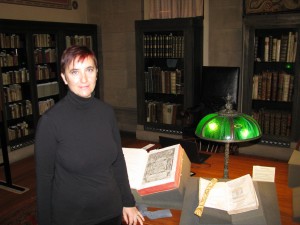Faculty Spotlight: An Interview with Elvira Vilches
Faculty Spotlight: An Interview with Dr. Elvira Vilches

MALS is proud to feature Dr. Elvira Vilches! Originally from Spain, Dr. Vilches is a member of the Department of Foreign Languages and Literatures at NC State. Since 2012, Dr. Vilches has been teaching courses for MALS. Her seminar this semester focuses on the cultural and natural history of chocolate.
What is your academic and/or professional background?
BA (English) University of Málaga, Spain; MA (Spanish) California State University, Los Angeles; Ph.D. (Romance Studies) at Cornell University. My research has been funded by the American Council of Learned Societies, the National Endowment for the Humanities, the John Carter Brown Library, the Folger Institute, and the Kluge Center. My research examines shifting notions and perceptions of cultural and economic values in 16thand 17th century Spain and the Americas. Publications include New World Gold: Cultural Anxiety and Monetary Disorder in Early Modern Spain (The University of Chicago Press, 2010), which was included in the 2011 list of outstanding academic books (Choice); and series of articles on Columbus, classical Spanish theater, the age of exploration, and cultural perceptions of money and financial crisis.
When/Why did you become interested in your area of study/research?
My area of study is the literature, culture, and history of 16th and 17th century Spain and Colonial Latin America. I became interested in this time period quite early. I grew up in cities deeply submerged in history, whose landscape combined Roman buildings with Gothic churches, medieval and Renaissance castles, as well as Arabic architecture. My interest grew as I went through college to graduate school. But the author that kindled my curiosity about parallel notions of value, be it aesthetic, moral, or monetary, is Columbus. Columbus’s quest for Asian markets and his ability to convey the wealth yet to be found as real inspired my first book. As I was finishing this book I realized that the concern about real sources of wealth and the true value of things blurred the obvious contrast between Columbus’s time and our own. This connection became obvious as Lehman Brothers went under in September 2008 when I was finishing the manuscript. Writing New World Gold also gave me the opportunity to think about stereotypes portraying imperial Spain as a backward culture only concerned with religion and the aristocracy. Instead I discovered a complex intellectual culture that explored key monetary and economic notions that are still relevant today.
What is your experience with the MALS program?
I enjoy teaching in the MALS program. MALS students bring to class an incredible appreciation for learning. They are driven to follow their own curiosity, examine their own questions, and explore new areas of knowledge that they ultimately make their own. MALS seminars are a source of inspiration to teach students to listen to the past to understand the present. It is rewarding to see students acquiring some understanding of the feelings, intentions, and behavior of people who lived in the past. This is a powerful feeling that makes both teaching and research immensely rewarding. The sensation intensifies as you immerse yourself in an earlier age and you are within a touching distance of the people who lived during this time.
What courses have you taught for MALS?
Two years ago I taught a course on gold, chocolate, and tobacco that explored how cultural perceptions of wealth, health, and morality changed from the age of discovery to the present. This semester I am focusing on chocolate to look at a different angle. The spring seminar examines the intertwined environment where cacao or cocoa trees flourished and the contrasting interpretations that sought to explain this ecological order. Thus the course focuses on how indigenous cultures in the Americas and Spanish colonial culture understood or misunderstood the multiple meanings of cacao and chocolate.
Tell us about your current research and academic pursuits.
I am currently working on a new book project, titled Doing Business: Commerce and Culture in Imperial Spain.The book looks at the encompassing mercantile culture that stemmed from the expansion of trade and the dissemination of the arts of commerce through the 16th and 17th in Spain and the Americas. This is an interdisciplinary study that brings together the history of economic thought, commercial textbooks teaching arithmetic, travel narratives depicting markets and goods, literary texts reflecting about wealth, money, and social relations, as well as economic studies discussing the virtues of commerce. In the process I am also am writing articles on culture and monetary practices, the close relationship between portable commercial handbooks and literary texts, and perceptions of globalization, during this time period. In the fall I gave an invited lecture in the History Graduate School at the University of Basel, Switzerland.
On June 4th I am giving a workshop commerce and culture in early modern Spain in the department of history at the University of Nottingham (UK). OnNovember 19th and 20th I have been invited to a symposium on the poetry of early colonial Latin America at the University of Cambridge (UK). At Nottingham I will talk about the expansion of far reach trade from Spain to both Europe and the Americas, commercial textbooks, and the impact of trade and commercial learning in the culture and literature of 16th and 17th century Spain. At Cambridge I will talk about poets in 16th century Peru, Mexico, and Colombia, who were mine owners and clerks, and how their occupations surface in poems discussing traffic and the difficulty of assessing the value of silver.